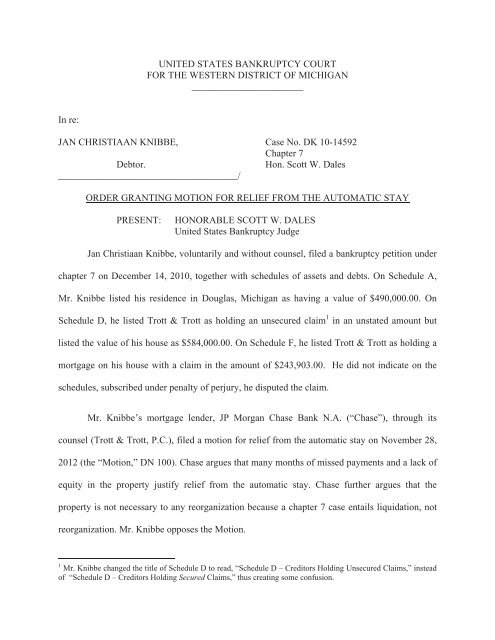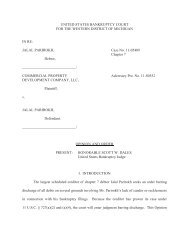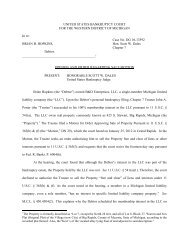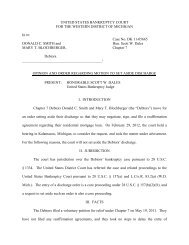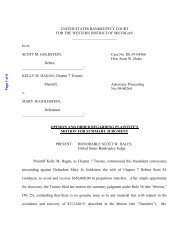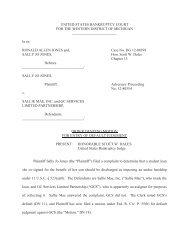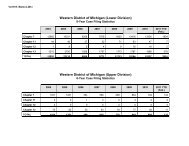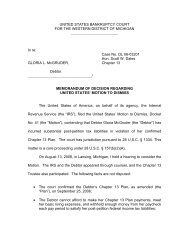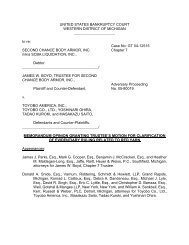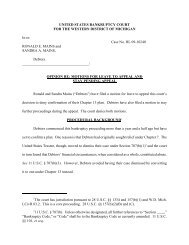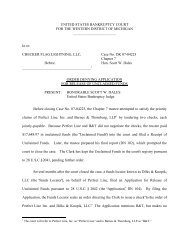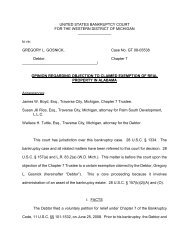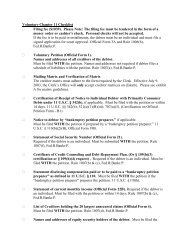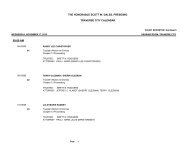Order Granting Motion for Relief From the Automatic Stay
Order Granting Motion for Relief From the Automatic Stay
Order Granting Motion for Relief From the Automatic Stay
Create successful ePaper yourself
Turn your PDF publications into a flip-book with our unique Google optimized e-Paper software.
UNITED STATES BANKRUPTCY COURT<br />
FOR THE WESTERN DISTRICT OF MICHIGAN<br />
_______________________<br />
In re:<br />
JAN CHRISTIAAN KNIBBE,<br />
Debtor.<br />
_____________________________________/<br />
Case No. DK 10-14592<br />
Chapter 7<br />
Hon. Scott W. Dales<br />
ORDER GRANTING MOTION FOR RELIEF FROM THE AUTOMATIC STAY<br />
PRESENT:<br />
HONORABLE SCOTT W. DALES<br />
United States Bankruptcy Judge<br />
Jan Christiaan Knibbe, voluntarily and without counsel, filed a bankruptcy petition under<br />
chapter 7 on December 14, 2010, toge<strong>the</strong>r with schedules of assets and debts. On Schedule A,<br />
Mr. Knibbe listed his residence in Douglas, Michigan as having a value of $490,000.00. On<br />
Schedule D, he listed Trott & Trott as holding an unsecured claim 1 in an unstated amount but<br />
listed <strong>the</strong> value of his house as $584,000.00. On Schedule F, he listed Trott & Trott as holding a<br />
mortgage on his house with a claim in <strong>the</strong> amount of $243,903.00. He did not indicate on <strong>the</strong><br />
schedules, subscribed under penalty of perjury, he disputed <strong>the</strong> claim.<br />
Mr. Knibbe’s mortgage lender, JP Morgan Chase Bank N.A. (“Chase”), through its<br />
counsel (Trott & Trott, P.C.), filed a motion <strong>for</strong> relief from <strong>the</strong> automatic stay on November 28,<br />
2012 (<strong>the</strong> “<strong>Motion</strong>,” DN 100). Chase argues that many months of missed payments and a lack of<br />
equity in <strong>the</strong> property justify relief from <strong>the</strong> automatic stay. Chase fur<strong>the</strong>r argues that <strong>the</strong><br />
property is not necessary to any reorganization because a chapter 7 case entails liquidation, not<br />
reorganization. Mr. Knibbe opposes <strong>the</strong> <strong>Motion</strong>.<br />
1 Mr. Knibbe changed <strong>the</strong> title of Schedule D to read, “Schedule D – Creditors Holding Unsecured Claims,” instead<br />
of “Schedule D – Creditors Holding Secured Claims,” thus creating some confusion.
As <strong>the</strong> moving party, Chase has <strong>the</strong> burden of proof on <strong>the</strong> issue of Mr. Knibbe’s equity<br />
in <strong>the</strong> property, and Mr. Knibbe, as <strong>the</strong> party opposing relief from stay, has <strong>the</strong> burden of proof<br />
on all o<strong>the</strong>r issues. See 11 U.S.C. § 362(g).<br />
As <strong>for</strong> <strong>the</strong> absence of equity under 11 U.S.C. § 362(d)(2), Chase’s argument is well<br />
taken. For what it is worth, <strong>the</strong> court notes that on May 9, 2011, Mr. Knibbe filed a protective<br />
claim on behalf of Paul Jay Vanportvliet with an attachment signed by Mr. Vanportvliet<br />
purporting to assert a “maritime lien” <strong>for</strong> $680,000.00 against Mr. Knibbe’s residence. On that<br />
same day, Mr. Knibbe filed an Amended Schedule D 2 reflecting this lien and changing <strong>the</strong> value<br />
of his residence to $210,000.00 (DN 29).<br />
Using <strong>the</strong> property’s highest reported value of $584,000.00, as originally stated at one<br />
point in Mr. Knibbe’s schedules, and <strong>the</strong> outstanding liens of Chase ($243,000.00) and Mr.<br />
Vanportvliet ($680,000.00), Chase posits <strong>the</strong>re is no equity in <strong>the</strong> property. Indeed, by adopting<br />
Mr. Knibbe’s property value of $210,000.00 on amended Schedule D, and his admission on<br />
Schedule F regarding Chase’s mortgage debt, 3<br />
<strong>the</strong> court finds no equity, even without<br />
considering <strong>the</strong> dubious maritime lien against <strong>the</strong> residence. Not only do <strong>the</strong>se admissions<br />
support Chase’s argument on equity, so, too, did <strong>the</strong> Trustee when he stated during <strong>the</strong> hearing,<br />
based on his fruitless ef<strong>for</strong>ts to sell <strong>the</strong> property over <strong>the</strong> last two years, he does not believe <strong>the</strong>re<br />
is any equity. The Trustee does not oppose <strong>the</strong> <strong>Motion</strong>.<br />
The court finds that Chase has met its burden of proof by showing that Mr. Knibbe has no<br />
equity in <strong>the</strong> property and as noted above, <strong>the</strong> property is not necessary to any reorganization.<br />
2 This time, Mr. Knibbe did not change <strong>the</strong> title on Schedule D.<br />
3 Mr. Knibbe scheduled Chase’s debt on Schedule F as a “mortgage” in <strong>the</strong> undisputed amount of $243,903.00.
In addition to its argument premised on absence of equity, Chase asks <strong>the</strong> court to find<br />
“cause” to grant relief from stay based on Mr. Knibbe’s failure to make monthly mortgage<br />
payments of $1,831.62 <strong>for</strong> over 32 months. At <strong>the</strong> hearing, Mr. Knibbe stated he would rely on<br />
his written response to <strong>the</strong> <strong>Motion</strong>, including two affidavits with attachments (DN 101). He did<br />
not request an opportunity to offer additional proofs. 4<br />
His written response stated in pertinent<br />
part that he or someone on his behalf mailed three separate “electronic funds transfer”<br />
instruments to Chase <strong>for</strong> $2,733.57, $250,000.00, and $41,000.00 to discharge his mortgage. The<br />
court has reviewed <strong>the</strong> submissions (including <strong>the</strong> attached documents) and observes <strong>the</strong>se<br />
supposed payments took <strong>the</strong> <strong>for</strong>m of personal checks from James Napier with peculiar notations<br />
apparently limiting <strong>the</strong> manner in which Chase could negotiate <strong>the</strong>m. These checks also<br />
included <strong>the</strong> condition <strong>the</strong>y were “<strong>for</strong> discharge of debt,” evidently in an ef<strong>for</strong>t to establish an<br />
accord and satisfaction, or similar agreement where <strong>the</strong>re was none. However, <strong>the</strong> affidavits and<br />
attached documents establish, at most, a tender of several irregular and conditional instruments,<br />
but certainly not payment or discharge of <strong>the</strong> Chase debt. Indeed, at <strong>the</strong> hearing, Chase’s counsel<br />
plausibly reported his client does not accept payment from third parties without prior<br />
arrangement and approval. Additionally, Chase does not accept instruments that impose<br />
conditions such as those that Mr. Napier —evidently a stranger to Chase— sought to impose.<br />
Chase stated it returned <strong>the</strong> checks, presumably to Mr. Napier. In short, Mr. Knibbe did not<br />
produce any persuasive proof he discharged his mortgage debt or even that Chase had somehow<br />
negotiated <strong>the</strong>se irregular personal checks and applied <strong>the</strong>m against <strong>the</strong> debt. There<strong>for</strong>e, <strong>the</strong> court<br />
finds that Mr. Knibbe did not rebut Chase’s assertion he failed to make payments <strong>for</strong> over 32<br />
months.<br />
4 The court may rely on affidavits in connection with motion practice. Fed. R. Civ. P. 43(c); Fed. R. Bankr. P. 9017.
Based on <strong>the</strong> <strong>Motion</strong>, Mr. Knibbe’s response, <strong>the</strong> statements of <strong>the</strong> Trustee and Chase’s<br />
counsel, <strong>the</strong> schedules, and <strong>the</strong> court’s familiarity with <strong>the</strong> file more generally, <strong>the</strong> court finds<br />
cause to grant relief from <strong>the</strong> automatic stay. Because Mr. Knibbe opposed <strong>the</strong> <strong>Motion</strong> and <strong>the</strong><br />
court perceives no urgency, <strong>the</strong> court will not waive <strong>the</strong> 14-day stay that would o<strong>the</strong>rwise apply<br />
under Fed. R. Bankr. P. 4001(a)(3).<br />
NOW, THEREFORE, IT IS HEREBY ORDERED as follows:<br />
1. Chase’s <strong>Motion</strong> (DN 100) is GRANTED, except as provided herein;<br />
2. This <strong>Order</strong> shall be stayed <strong>for</strong> 14 days from entry as prescribed in Fed. R.<br />
Bankr. P. 4001(a)(3).<br />
IT IS FURTHER ORDERED that <strong>the</strong> Clerk shall serve a copy of this <strong>Order</strong> pursuant to<br />
Fed. R. Bankr. P. 9022 and LBR 5005-4 upon Jan Christiaan Knibbe, Stephen L.<br />
Langeland, Esq., James W. Batchelor, Esq., and <strong>the</strong> United States Trustee.<br />
END OF ORDER<br />
IT IS SO ORDERED.<br />
Dated January 11, 2013


